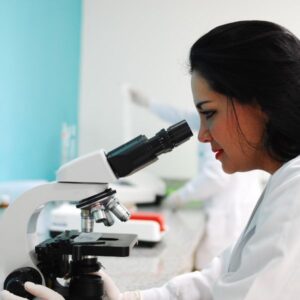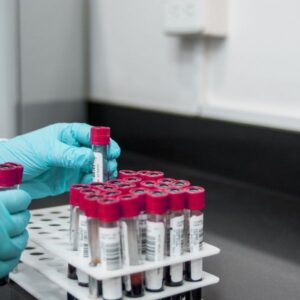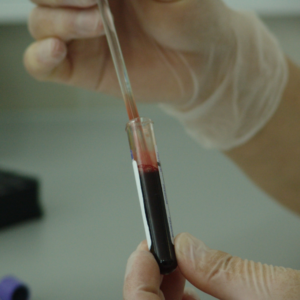Serological tests, also known as antibody tests, are diagnostic tests that help identify whether an individual has been infected with a particular pathogen, such as a virus or bacterium. These tests detect the presence of antibodies that the immune system produces in response to an infection.
Serological tests are widely used in medical research, forensic science, and disease surveillance. The COVID-19 pandemic has elevated the importance of serological testing due to the need to identify individuals who have been infected with SARS-CoV-2, the virus that causes COVID-19. This article provides an overview of serological tests, their uses, limitations, challenges, and future directions.

Table of Contents
Introduction to Serological Tests
Serological tests are laboratory procedures that detect the presence of antibodies, antigens, or specific nucleic acids in a patient’s blood serum. These tests have become an essential tool in the medical field, aiding in the diagnosis and monitoring of various diseases, including infectious diseases, autoimmune disorders, cancer, and allergies. In this article, we will delve into the basics of serological tests, their types, uses, and interpretation of their results.
What are Serological Tests
Serological tests measure the response of the immune system to an infectious agent or other foreign substances. When a pathogenic agent enters the body, the immune system produces specific antibodies, which are proteins that bind to the agent and neutralize or eliminate it. Likewise, antigens, which are protein or carbohydrate markers of the pathogen, can stimulate the immune system to produce antibodies. Serological tests detect the presence and concentration of these antibodies or antigens in a patient’s blood serum, providing valuable information about the infection status and stage.
History of Serological Tests
The history of serological testing dates back to the early 20th century, when scientists discovered that they could detect antibodies in the blood of animals and humans exposed to infectious diseases. In the following decades, serological testing has expanded to include a wide range of diagnostic and research applications, from blood typing and pregnancy testing to hepatitis and HIV detection. Today, serological tests have become more precise, faster, and easier to perform using advanced laboratory techniques and automation.
Types of Serological Tests
There are four main types of serological tests, each with a specific target and mechanism of detection. These tests can be performed on blood, serum, plasma, or other body fluids, depending on the target analyte.
a) Antibody Detection Tests
Antibody detection tests, also known as serology tests, measure the presence and amount of specific antibodies in the blood. These tests can help diagnose infectious diseases, autoimmune disorders, and allergies, as well as monitor the immune response to vaccines and therapies. Common examples of antibody detection tests include ELISA, Western blot, rapid diagnostic tests, and neutralization assays.
b) Antigen Detection Tests
Antigen detection tests detect the presence of specific antigens or proteins produced by the pathogen in the patient’s blood. These tests are useful for diagnosing acute infections, such as strep throat, influenza, and COVID-19, and monitoring the effectiveness of treatment. Examples of antigen tests include rapid diagnostic tests and fluorescence immunoassays.
c) Nucleic Acid Tests
Nucleic acid tests detect the presence and amount of specific genetic material, such as RNA or DNA, in the patient’s sample. These tests are highly sensitive and specific, allowing for early detection of infections and accurate diagnosis of genetic disorders. Examples of nucleic acid tests include polymerase chain reaction (PCR), loop-mediated isothermal amplification (LAMP), and next-generation sequencing (NGS).
d) ELISA Tests
ELISA (enzyme-linked immunosorbent assay) tests use specific antibodies and antigens to detect the presence of a target analyte in the patient’s blood. These tests are highly sensitive and can detect low levels of antibodies or antigens. ELISA tests are widely used in research, diagnosis, and quality control, such as detecting food allergens or measuring hormone levels.

Uses of Serological Tests
Serological tests have numerous applications in the medical field, including diagnosing and monitoring diseases, conducting research, and aiding forensic investigations.
a. Diagnostic Applications
Serological tests are essential for diagnosing infectious diseases, such as HIV, hepatitis, and COVID-19. These tests can detect the presence of specific antibodies or antigens in the patient’s blood, indicating the infection status and stage. Serological tests can also aid in diagnosing autoimmune disorders, such as lupus and rheumatoid arthritis, and allergies, such as food allergies and asthma.
b. Medical Research Applications
Serological tests play a crucial role in medical research, helping scientists understand the immune response to infections, vaccines, and therapies. These tests can measure the antibody titers in the population, track the spread of epidemics, and identify new biomarkers for diseases. Serological tests can also be used to screen blood donors for infectious agents and ensure the safety of blood transfusions.
c. Forensic Applications
Serological tests can aid forensic investigations by detecting the presence of blood, semen, or saliva in crime scenes or specimens. These tests can use specific antibodies or antigens to identify the source of the biological material and link it to the suspect or victim. Serological tests can also be used to determine the cause of death in post-mortem examinations.
Serological Tests for Different Diseases
i. Serological Test for Syphilis
Serological tests are commonly used to diagnose syphilis, a sexually transmitted infection caused by the bacterium Treponema pallidum. The tests detect antibodies produced by the body in response to the infection. The most commonly used test is the Venereal Disease Research Laboratory (VDRL) test, which detects antibodies to cardiolipin, a component of the bacterium’s cell wall.
ii. Serological Test for Rheumatoid Arthritis
Serological tests can help diagnose rheumatoid arthritis, an autoimmune disorder that causes joint inflammation and pain. The tests detect the presence of rheumatoid factor (RF) and anti-cyclic citrullinated peptide (anti-CCP) antibodies in the blood. These antibodies are produced by the immune system in response to inflammation in the joints.
iii. Serological Test for Chagas
Serological tests can be used to diagnose Chagas disease, a parasitic infection caused by the protozoan Trypanosoma cruzi. The tests detect antibodies to the parasite in the blood. The most commonly used tests are the indirect immunofluorescence assay (IFA) and the enzyme-linked immunosorbent assay (ELISA).
iv. Serological Test for Dengue Fever
Serological tests can help diagnose dengue fever, a viral infection transmitted by mosquitoes. The tests detect antibodies to the dengue virus in the blood. The most commonly used test is the enzyme-linked immunosorbent assay (ELISA).
v. Serological Test for Celiac Disease
Serological tests can help diagnose celiac disease, an autoimmune disorder that causes damage to the small intestine when gluten is consumed. The tests detect antibodies to tissue transglutaminase (tTG) and deamidated gliadin peptide (DGP) in the blood. These antibodies are produced by the immune system in response to gluten.
vi. Serological Test for Malaria
Serological tests can be used to diagnose malaria, a parasitic infection transmitted by mosquitoes. The tests detect antibodies to the malaria parasite in the blood. The most commonly used tests are the immunochromatographic test (ICT) and the enzyme-linked immunosorbent assay (ELISA).
vii. Serological Test for Tuberculosis
Serological tests can help diagnose tuberculosis (TB), a bacterial infection that primarily affects the lungs. The tests detect antibodies to Mycobacterium tuberculosis, the bacterium that causes TB, in the blood. However, the World Health Organization (WHO) does not recommend the use of serological tests for TB diagnosis due to their limited accuracy.

Serological Testing in the Context of COVID-19
The COVID-19 pandemic has highlighted the importance of serological testing in understanding the spread and immunity to the virus.
a. Overview of COVID-19 Serological Testing
Serological tests for COVID-19 detect antibodies against the virus in a person’s blood. These tests can help identify individuals who have been infected with the virus and potentially developed immunity.
b. Interpreting COVID-19 Serological Test Results
However, interpreting COVID-19 serological test results can be challenging due to issues with test specificity and sensitivity, as well as the timing of administration. A positive result may indicate past infection and potential immunity, while a negative result may not necessarily rule out a current infection.
c. Current Status of COVID-19 Serological Testing
Currently, the FDA has authorized several serological tests for emergency use in the United States. However, there are concerns about the accuracy and reliability of these tests, and further research is needed to fully understand their limitations and applications.
Serological Test Results and Interpretation
Interpreting the results of serological tests requires understanding the type of test, the target analyte, the reference range, and the clinical context.
Positive results indicate the presence of specific antibodies or antigens, which may indicate a current or past infection, vaccination, or exposure. Negative results indicate the absence of the target analyte, which may indicate no infection or a window period where the antibody or antigen level is too low to detect.
Inconclusive results may require further testing or clinical evaluation to confirm or rule out the diagnosis. Consultation with a healthcare provider or a laboratory specialist is crucial for the proper interpretation and management of serological test results.
Serological Test Limitations and Challenges
Serological tests, which detect antibodies in a person’s blood, can provide valuable information about past infections and immunity. However, there are limitations to these tests that must be considered.
i. Specificity and Sensitivity
One key limitation is the specificity and sensitivity of these tests. Specificity refers to the ability of a test to correctly identify those who do not have the antibodies of interest. Sensitivity refers to the ability of a test to correctly identify those who do have the antibodies of interest. Serological tests can have varying levels of both specificity and sensitivity, which can lead to false positives or false negatives.
Calculation Formula for Sensitivity and Specificity
Sensitivity = (number of true positives) / (number of true positives + number of false negatives)
Specificity = (number of true negatives) / (number of true negatives + number of false positives)
ii. Timing of Test Administration
Another challenge with serological tests is the timing of administration. Antibodies may not appear until several days or weeks after infection, and they may only last for a limited amount of time. This means that a negative test result does not necessarily rule out a current infection, and a positive test result does not necessarily guarantee immunity.
iii. False Positives and False Negatives
Serological tests can also produce false positives and false negatives due to cross-reactivity with other viruses or antibodies, as well as issues with sample handling and interpretation. False positives can lead to unnecessary quarantine or treatment, while false negatives can lead to a false sense of security and the potential spread of infection.
Future of Serological Testing
Despite the challenges, serological testing has the potential for further advancements and applications.
a. Advances in Serological Test Technology
New technologies, such as point-of-care testing and multiplex assays, can improve the accuracy, speed, and accessibility of serological testing.
b. New Applications of Serological Testing
Serological testing can also have new applications beyond infectious diseases, such as in autoimmune and cancer research.
Conclusion and Summary of Serological Tests
Serological testing can provide valuable information about past infections and immunity, but there are limitations and challenges that must be considered. The COVID-19 pandemic has highlighted the importance of serological testing, but further research is needed to fully understand the accuracy and reliability of these tests. The future of serological testing holds potential for advancements and new applications.
In conclusion, serological tests are important tools for diagnosing infectious diseases and studying the immune response to pathogens. Despite their limitations and challenges, advances in technology and research will continue to improve the accuracy and reliability of these tests. The COVID-19 pandemic has demonstrated the critical role of serological testing in disease control and prevention. As we move forward, serological testing will remain a valuable component of our medical and public health arsenal.
Frequently Asked Questions (FAQ)
1. What is the difference between serological tests and molecular tests?
Serological tests detect the presence of antibodies in a person’s blood, while molecular tests, such as PCR tests, detect the genetic material of the pathogen itself. Serological tests are used to determine whether an individual has been infected with a particular pathogen in the past, whereas molecular tests are used to diagnose an active infection.
2. Can serological tests be used to diagnose COVID-19?
Serological tests are not recommended as the primary method for diagnosing COVID-19. This is because it takes time for the immune system to produce detectable levels of antibodies, and serological tests may produce false-negative results during the early stages of infection. Molecular tests are the recommended method for diagnosing COVID-19.
3. Are serological test results always accurate?
Serological tests have limitations and can produce false-positive or false-negative results. The accuracy of the test depends on several factors, including the specific test used, the timing of the test, and the prevalence of the disease in the population being tested. It is important to interpret serological test results in the context of a person’s symptoms, history, and exposure to the pathogen.
4. What is the future of serological testing?
Advances in technology and research will continue to improve the accuracy and reliability of serological tests. New applications of serological testing, such as serosurveillance and seroprevalence studies, will help us better understand the spread of infectious diseases and inform public health interventions. Serological testing will likely remain an important tool in our medical and public health toolbox for years to come.
You May Also Like
- NVS Staff Nurse Vacancy 2024 – How to Apply
- AIIMS NORCET 6 and ESIC Nursing Exam Questions and Answers
- ESIC Nursing Officer Recruitment 2024 | 1930 Vacancies – Apply Now
- Dream Job Alert: AIIMS NORCET Nursing Officer Vacancy 2024 – Apply Now!
- NIMHANS Nursing Officer Exam 17-12-2023 Memory-Based Solved Questions